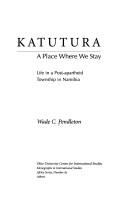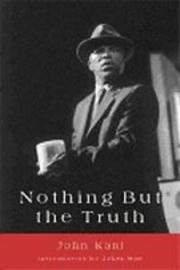| Listing 1 - 10 of 23 | << page >> |
Sort by
|
Book
ISBN: 9781868149896 1868149897 9781868148899 1868148890 Year: 2015 Publisher: Johannesburg Wits University Press
Abstract | Keywords | Export | Availability | Bookmark
 Loading...
Loading...Choose an application
- Reference Manager
- EndNote
- RefWorks (Direct export to RefWorks)
Missing is the story of Robert Khalipa, an ANC cadre living in exile, who is very senior in the organisation but is left out of the negotiations and almost forgotten in Sweden. Robert has a wealthy Swedish wife, Anna, and they have a daughter who is a practising doctor in a hospital in Stockholm. There is also Robert's protégé Peter Tshabalala, junior in the organisation, yet he gets the call to return to South African to join the democratic government. What follows is a story of conspiracies, lies, back stabbing and disappointments. Robert and his family are faced with the challenges of a South Africa that has changed radically from the one he remembers from more than thirty years ago. The government, in his opinion, does not seem to uphold the principles enshrined in the Freedom Charter. There is also conflict within his own family. Robert wants to stay in South Africa, while his wife and daughter want to go back to Sweden. Their love is tested to breaking point and difficult decisions have to be made by every individual. As with Kani's very successful and often-performed previous play, Nothing but the Truth, the ambiguities of freedom and of personal commitment are explored in this play.
Post-apartheid era --- Postapartheid era --- Apartheid --- South Africa
Book
Year: 2019 Publisher: Berlin/Germany Logos Verlag Berlin
Abstract | Keywords | Export | Availability | Bookmark
 Loading...
Loading...Choose an application
- Reference Manager
- EndNote
- RefWorks (Direct export to RefWorks)
This study analyses the representation of Durbanite and Capetonian urban spaces in the following selection of post-apartheid works: Mariam Akabor's ''Flat 9'', Rozena Maart's ''Rosa's District Six'', Johan van Wyk's ''Man Bitch'', K. Sello Duiker's ''Thirteen Cents'', Bridget McNulty's ''Strange Nervous Laughter'', and Lauren Beukes' ''Moxyland''. The focus lies on the interrelatedness of shifting post-apartheid subjectivities and urban space (and place) in these literary works. The analysis not only grants access to different ‘new voices` of post-apartheid literature, it also sheds light on the perception of South African history, urban geography, and cultural topography – essentially, on real as well as imagined South African urban spaces – as the literary representations of city-spaces become archives of cultural transformation processes; a gateway to the understanding of the developments and changes of, and within, the two cities in question.
Cities and towns in literature. --- Urbanization --- Südafrika --- Postapartheid Literatur --- Postkoloniale Literatur --- Raumtheorie --- Identität --- South Africa --- South Africa --- Literature. --- Literature. --- Südafrika --- Postapartheid Literatur --- Postkoloniale Literatur --- Raumtheorie --- Identität

ISBN: 0896801888 Year: 1996 Publisher: Athens Ohio university press
Abstract | Keywords | Export | Availability | Bookmark
 Loading...
Loading...Choose an application
- Reference Manager
- EndNote
- RefWorks (Direct export to RefWorks)
#SBIB:39A73 --- Etnografie: Afrika --- Katatura (Windhoek, Namibia) --- Post apartheid era --- Postapartheid era --- Apartheid
Book
Year: 2019 Publisher: Berlin/Germany Logos Verlag Berlin
Abstract | Keywords | Export | Availability | Bookmark
 Loading...
Loading...Choose an application
- Reference Manager
- EndNote
- RefWorks (Direct export to RefWorks)
This study analyses the representation of Durbanite and Capetonian urban spaces in the following selection of post-apartheid works: Mariam Akabor's ''Flat 9'', Rozena Maart's ''Rosa's District Six'', Johan van Wyk's ''Man Bitch'', K. Sello Duiker's ''Thirteen Cents'', Bridget McNulty's ''Strange Nervous Laughter'', and Lauren Beukes' ''Moxyland''. The focus lies on the interrelatedness of shifting post-apartheid subjectivities and urban space (and place) in these literary works. The analysis not only grants access to different ‘new voices` of post-apartheid literature, it also sheds light on the perception of South African history, urban geography, and cultural topography – essentially, on real as well as imagined South African urban spaces – as the literary representations of city-spaces become archives of cultural transformation processes; a gateway to the understanding of the developments and changes of, and within, the two cities in question.
Cities and towns in literature. --- Urbanization --- South Africa --- Literature. --- Südafrika --- Postapartheid Literatur --- Postkoloniale Literatur --- Raumtheorie --- Identität
Book
Year: 2019 Publisher: Berlin/Germany Logos Verlag Berlin
Abstract | Keywords | Export | Availability | Bookmark
 Loading...
Loading...Choose an application
- Reference Manager
- EndNote
- RefWorks (Direct export to RefWorks)
This study analyses the representation of Durbanite and Capetonian urban spaces in the following selection of post-apartheid works: Mariam Akabor's ''Flat 9'', Rozena Maart's ''Rosa's District Six'', Johan van Wyk's ''Man Bitch'', K. Sello Duiker's ''Thirteen Cents'', Bridget McNulty's ''Strange Nervous Laughter'', and Lauren Beukes' ''Moxyland''. The focus lies on the interrelatedness of shifting post-apartheid subjectivities and urban space (and place) in these literary works. The analysis not only grants access to different ‘new voices` of post-apartheid literature, it also sheds light on the perception of South African history, urban geography, and cultural topography – essentially, on real as well as imagined South African urban spaces – as the literary representations of city-spaces become archives of cultural transformation processes; a gateway to the understanding of the developments and changes of, and within, the two cities in question.
Cities and towns in literature. --- Urbanization --- South Africa --- Literature. --- Südafrika --- Postapartheid Literatur --- Postkoloniale Literatur --- Raumtheorie --- Identität
Book
Year: 2019 Publisher: Berlin/Germany Logos Verlag Berlin
Abstract | Keywords | Export | Availability | Bookmark
 Loading...
Loading...Choose an application
- Reference Manager
- EndNote
- RefWorks (Direct export to RefWorks)
This book focuses on six post-apartheid novels, namely Zo¨e Wicomb's ''Playing in the Light'' (2006), Marlene van Niekerk's ''Agaat'' (2004/2007), André Brink's ''Devil's Valley'' (1998), Sarah Penny's ''The Beneficiaries'' (2002), K Sello Duiker's ''Thirteen Cents'' (2000), and Kgebetli Moele's ''Room 207'' (2006). It aims at highlighting different manifestations of melancholia that are visible in these texts in particular and in post-apartheid writing more generally. Mainly based on Sigmund Freud's, Anne Cheng's, and Paul Gilroy's concepts of melancholia, most novels are regarded as melancholic counter-narratives to the South African Truth and Reconciliation Commission's attempt to initiate a nationwide process of mourning with the aim of subsequent closure of the apartheid past. Moreover, concepts of melancholia prove particularly useful in order to analyse issues such as complicity, uncritical whiteness, crises of identity, forms of resistance, and intergenerational memory.
Melancholy in literature --- Postcolonialism in literature --- Identity (Philosophical concept) in literature --- South African fiction. --- Südafrika --- Postapartheid Literatur --- Postkoloniale Literatur --- Truth and Reconciliation Commission --- Melancholie --- South Africa --- In literature. --- Südafrika --- Postapartheid Literatur --- Postkoloniale Literatur --- Truth and Reconciliation Commission --- Melancholie
Book
ISBN: 160938332X 1609383273 9781609383329 9781609383275 Year: 2015 Publisher: Iowa City
Abstract | Keywords | Export | Availability | Bookmark
 Loading...
Loading...Choose an application
- Reference Manager
- EndNote
- RefWorks (Direct export to RefWorks)
Post-apartheid era --- Postapartheid era --- Apartheid --- Economic aspects --- Social aspects --- South Africa --- Africa, South --- Economic conditions --- Social conditions

ISBN: 1868143899 186814657X Year: 2002 Publisher: Johannesburg : Wits University Press
Abstract | Keywords | Export | Availability | Bookmark
 Loading...
Loading...Choose an application
- Reference Manager
- EndNote
- RefWorks (Direct export to RefWorks)
Nothing but the Truth is a story of two brothers, of sibling rivalry, of exile, of memory and reconciliation, of the perplexities of freedom.
Brothers --- Post-apartheid era --- Sibling rivalry --- South Africa --- Rivalry, Sibling --- Child psychology --- Competition (Psychology) --- Jealousy in children --- Postapartheid era --- Apartheid
Book
ISBN: 186814965X 1868149676 9781868149674 9781868149650 9781868149643 1868149641 Year: 2016 Publisher: Johannesburg Wits University Press
Abstract | Keywords | Export | Availability | Bookmark
 Loading...
Loading...Choose an application
- Reference Manager
- EndNote
- RefWorks (Direct export to RefWorks)
In Losing the Plot, well-known scholar and writer Leon de Kock offers a lively and wide-ranging analysis of postapartheid South African writing which, he contends, has morphed into a far more flexible and multifaceted entity than its predecessor. If postapartheid literature's founding moment was the 'transition' to democracy, writing over the ensuing years has viewed the Mandelan project with increasing doubt. Instead, authors from all quarters are seen to be reporting, in different ways and from divergent points of view, on what is perceived to be a pathological public sphere in which the plot - the mapping and making of social betterment - appears to have been lost. The compulsion to detect forensically the actual causes of such loss of direction has resulted in the prominence of creative nonfiction. A significant adjunct in the rise of this is the new media, which sets up a 'wounded' space within which a 'cult of commiseration' compulsively and repeatedly plays out the facts of the day on people's screens. This, De Kock argues, is reproduced in much postapartheid writing. And, although fictional forms persist in genres such as crime fiction, with their tendency to overplot, more serious fiction underplots, yielding to the imprint of real conditions to determine the narrative construction.
South African fiction (English) --- Post-apartheid era --- Postapartheid era --- Apartheid --- English fiction --- South African literature (English) --- History and criticism. --- In literature. --- Crime in literature.
Book
Year: 2019 Publisher: Berlin/Germany Logos Verlag Berlin
Abstract | Keywords | Export | Availability | Bookmark
 Loading...
Loading...Choose an application
- Reference Manager
- EndNote
- RefWorks (Direct export to RefWorks)
This book focuses on six post-apartheid novels, namely Zo¨e Wicomb's ''Playing in the Light'' (2006), Marlene van Niekerk's ''Agaat'' (2004/2007), André Brink's ''Devil's Valley'' (1998), Sarah Penny's ''The Beneficiaries'' (2002), K Sello Duiker's ''Thirteen Cents'' (2000), and Kgebetli Moele's ''Room 207'' (2006). It aims at highlighting different manifestations of melancholia that are visible in these texts in particular and in post-apartheid writing more generally. Mainly based on Sigmund Freud's, Anne Cheng's, and Paul Gilroy's concepts of melancholia, most novels are regarded as melancholic counter-narratives to the South African Truth and Reconciliation Commission's attempt to initiate a nationwide process of mourning with the aim of subsequent closure of the apartheid past. Moreover, concepts of melancholia prove particularly useful in order to analyse issues such as complicity, uncritical whiteness, crises of identity, forms of resistance, and intergenerational memory.
Melancholy in literature --- Postcolonialism in literature --- Identity (Philosophical concept) in literature --- South African fiction. --- South Africa --- In literature. --- Südafrika --- Postapartheid Literatur --- Postkoloniale Literatur --- Truth and Reconciliation Commission --- Melancholie
| Listing 1 - 10 of 23 | << page >> |
Sort by
|

 Search
Search Feedback
Feedback About UniCat
About UniCat  Help
Help News
News